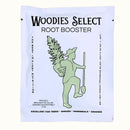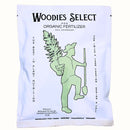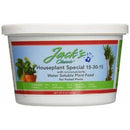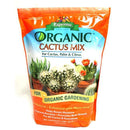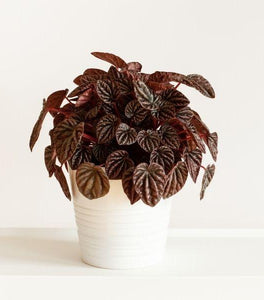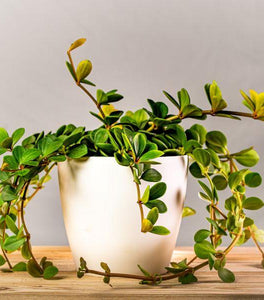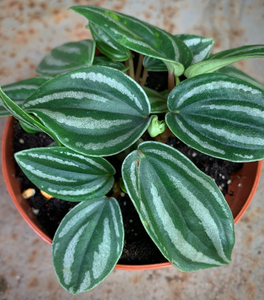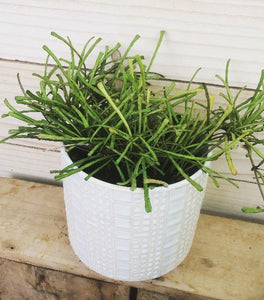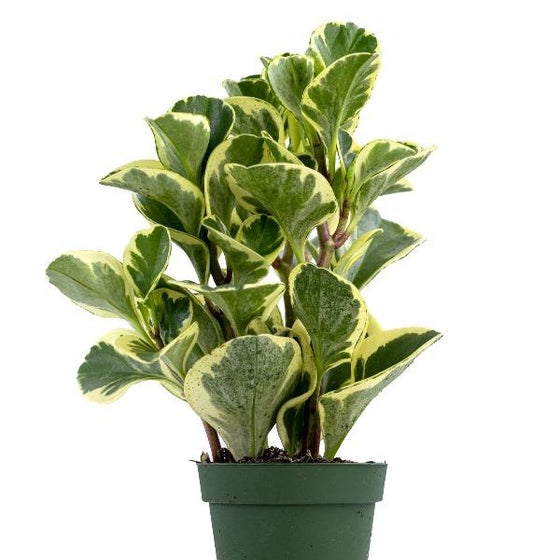
Images Depicted Range in Maturity & Container Size
Pots & Decorations Not Included Unless Otherwise Stated
Variegated Peperomia Obtusifolia For Sale Online
Peperomia obtusifolia plants (baby rubber plants) are wonderful succulent-like plants from the Piperaceae family. Native to South America, these durable small houseplants are perfect for tabletops and windowsills. They can live in medium to low light, but a bright indirect light source will make your peperomia obtusifolia happy.
As far as plant care, these are very popular as houseplants because they are easy to maintain. They will do just fine in a wide variety of indoor situations, making them a great beginner plant.
Variegated peperomia obtusifolia have thick upright stems and rounded glossy leaves that grow from petioles. Some cultivars of peperomia obtusifolia have thinner, rounder leaves, and some have thicker leaves with a very slight wave to the sides of the leaf. Under the right conditions, this plant will bloom tiny white flowers that grow along their long flower spikes. You can prune some leaves or the top petioles off the stems to encourage fuller growth.
Fun fact: Variegated Peperomia obtusifolia plants are also known as baby rubber plants or American rubber plants. The nicknames come from the fact that they are a distant cousin to Hevea brasiliensis - the Pará rubber tree!
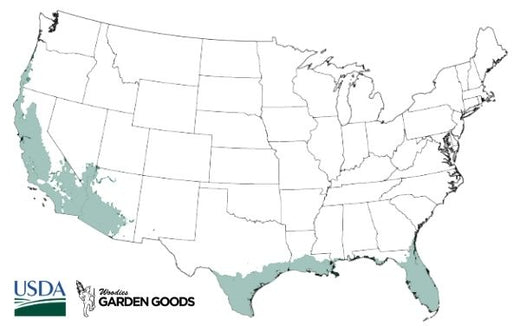
| Hardiness Zone: | 9-11 |
|---|---|
| Mature Height: | 10-20 Inches |
| Mature Width: | 8-15 inches |
| Classification: | Herbaceous perennial |
| Sunlight: | Fluorescent to bright indirect |
| Flowers: | White flowers on flower spike |
| Foliage: | Variegated green |
| Soil Condition: | Likes to dry out some between watering |
| Uses: | Attractive plant to be featured on a tabletop or windowsill, does well with minimal care |
How to Care for Variegated Baby Rubber Plants
Be sure to read our planting instructions to ensure a healthy and happy plant for years to come!
When should I re-pot my Variegated Peperomia obtusifolia?
Most of the plants we sell are not ready to be replanted. After it has acclimated in your home after arrival, then you can repot into a pot of a similar size. Peperomia obtusifolias do not have a large root system and are happy in smaller containers. A popular potting technique is to place your plant, with its nursery pot, inside a large decorative container and ensure the plant has adequate drainage holes to prevent root rot disease. Once it is difficult to place your finger into the soil because of the root system- it is probably time to repot to the next nursery pot size up. Depending on how your plant grows and how you prune it, this could be quite a while.
How do I water Variegated Peperomia Obtusifolia?
Peperomia obtusifolia should receive water relatively infrequently, as the plants like to dry out some between watering. The easiest way to tell if a plant needs water is by the weight of the container. If the container is heavy and the foliage is upright, chances are good the plant doesn't need water, whereas a light pot and limp foliage mean the plant needs some water. If unsure, press your index finger into the top inch of the soil. If the potting soil still feels dry up to the first joint, then it should be OK to water your baby rubber plant.

How much light does my Variegated Baby Rubber Plant need?
Peperomia obtusifolias are native to the rainforests of South America. They thrive in environments with partial to bright indirect sunlight and high humidity. However, these are also very resilient plants and will do just fine without either. A happy, well-lit, and well-established peperomia obtusifolia Variegata will grow faster, produce more variegated leaves, and bloom flowers on tall flower spikes. Make sure you don't put your peperomia in harsh, direct sunlight.

What is the best soil for Variegated Baby Rubber Plants?
The best soil is a well-balanced mix of peat moss, perlite, and vermiculite that dries some between watering but takes a long time to compact. Typically, any reputable potting mix will work well and includes those ingredients. Mixing an orchid or cactus soil with indoor potting soil will usually help create the best of both worlds. If fertilizer is already in the potting mix, there won't be a need to add any additional fertilizer for a while.








